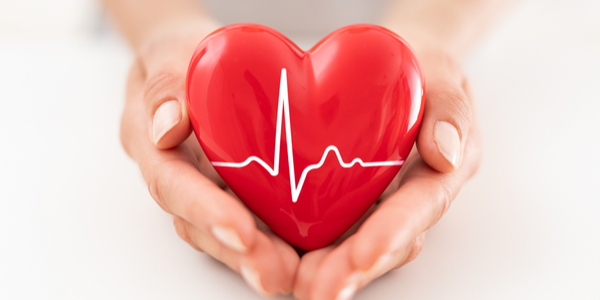Lower Your Blood Pressure During American Heart Awareness Month
February 14, 2022
February is American Heart Month, a time when all people can focus on their cardiovascular health. The Division for Heart Disease and Stroke Prevention is shining a light on hypertension (high blood pressure), a leading risk factor for heart disease and stroke.
Are you one of the 116 million people in the United States who has high blood pressure? High blood pressure, or hypertension, is defined as a systolic blood pressure greater than 130 mmHg or a diastolic blood pressure greater than 80 mmHg. February is American Heart Month. Read on to learn how you can protect your heart and stay healthy.
High blood pressure is often called the “silent killer” because it frequently has no symptoms but puts you at risk for heart disease and stroke, which are leading causes of death for both men and women in the United States. It can develop slowly over time and can be related to many causes.
Heart-healthy living involves understanding your risk, making choices and taking steps to reduce your chances of getting heart disease, including coronary heart disease, the most common type. By taking preventive measures, you can lower your risk of developing heart disease and also improve your overall health and well-being.
Recognize Your Risks
It’s important to be aware of your risk factors—the physical and lifestyle attributes that can make you more likely to develop high blood pressure—so you can identify positive changes to make. Each risk factor increases a person’s chance of developing heart disease, so the more risks you have, the higher your overall risk.
Your risk of heart disease is higher if you:
• Have high blood pressure
• Have high cholesterol
• Are overweight or obese
• Have prediabetes or diabetes
• Smoke
• Do not get regular physical activity
• Have a family history of early heart disease
• Have unhealthy eating behaviors
• Are older (age 55 or older for women or age 45 or older for men)
Here are five lifestyle changes you can make to help reduce hypertension:
• Eat Healthier
Good nutrition influences your ability to maintain a healthy weight, which is a key to reducing high blood pressure. Add a serving of fruits and vegetables to each meal. Eat lean meats, such as poultry and fish, and include more whole grains and beans to your diet. Limit your sodium consumption to 1,500 mg/day.
• Improve Sleep Habits
Getting good sleep isn’t just important for your energy levels— it’s critical for your heart health, too.
Most adults need at least 7 hours of sleep each night. Having sleep
problems means your blood pressure stays elevated for a longer period of time, so aim for good quality sleep each night.
• Manage Stress
Managing stress is good for your overall health and well-being. A stressful situation causes your body to release adrenaline, a hormone that temporarily causes your breathing and heart rate to speed up and your blood pressure to rise. Exercising regularly can help relieve stress, tension, anxiety and depression. Maintaining social connections, practicing relaxation techniques and finding a stimulating hobby can all help you relax more and reduce stress.
• Increase Activity and Exercise
Exercise improves blood flow and strengthens your muscles, including your heart. Discuss an exercise plan with your doctor and begin with 5-10 minutes per day of aerobic activity until you can work up to exercising most days, 20-60 minutes per session. Be sure to include muscle strengthening and flexibility exercises at least 2 days each week.
• Avoid Alcohol and Smoking
The American Heart Association recommends moderate alcohol consumption, which means an average of 1-2 drinks per day for men and one drink per day for women.
Tobacco use is extremely detrimental to your heart health, so takes steps to quit as soon as you can.
To learn more, please visit: www.cdc.gov/heartdisease
While every effort has been taken in compiling this information to ensure that its contents are totally accurate, neither the publisher nor the author can accept liability for any inaccuracies or changed circumstances of any information herein or for the consequences of any reliance placed upon it. This publication is distributed on the understanding that the publisher is not engaged in rendering legal, accounting or other professional advice or services. Readers should always seek professional advice before entering into any commitments.
Sources: https://www.cdc.gov/bloodpressure/facts.htm https://www.nhlbi.nih.gov/health-topics/heart-healthy-living www.healthadvocate.com https://www.cdc.gov/bloodpressure/sleep.htm https://www.heart.org/en/healthy-living/healthy-lifestyle/stress-management/stress-and-heart-health https://www.heart.org/en/healthy-living/healthy-eating/eat-smart/nutrition-basics/alcohol-and-heart-health


